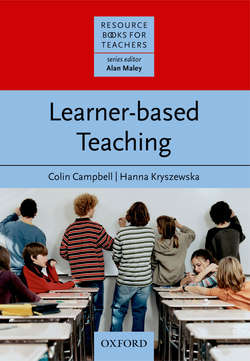Читать книгу Learner-Based Teaching - Colin Campbell - Страница 4
На сайте Литреса книга снята с продажи.
Foreword
ОглавлениеIn the kind of classrooms with which most of us are familiar it is normal and expected that teachers will make most, if not all, of the decisions about the teaching content and materials. And that, in a majority of cases, teaching will be based on some sort of published or pre-determined materials.
This book presents a radical alternative to both these assumptions.
In the first place, the learners take over much of the decisionmaking normally assigned to teachers. The approach makes learner-input central to the learning process. It is the learners themselves who become the major teaching resource. It shows how, by tapping into the knowledge and experience of the learners, the quality of the learning process is enhanced, since it becomes both more relevant and more deeply felt. There is a sense in which the teacher becomes a learner and learners are transformed into teachers.
In the second place there is a clear move away from dependence on the pre-determined content and format of published materials: every class will bring its own unique mix of individuals and their past experiences; every lesson will generate a unique set of needs. This freedom from dependence on sophisticated materials or technology makes the approach especially suitable for resource-poor environments, and it is perhaps no accident that the authors developed it in Poland where, at the time, access to such facilities was rare.
There are clear links between this approach and the current trend towards Learner Autonomy, Self-directed Learning, and Learner Independence. Perhaps unusually however, the emphasis here is on Learner Independence in the group mode rather than the individual self-study mode.
Among its ancillary advantages is its power as a tool for teacher development. No teacher taking this route can fail to develop both as a person and as a professional.
The approach offers an exciting and rewarding alternative to those teachers willing to try it. It undoubtedly takes courage to cast off from the security of control and pre-determined materials, to trust to the power of process and of learner-input, but the rewards are correspondingly great.
Alan Maley
